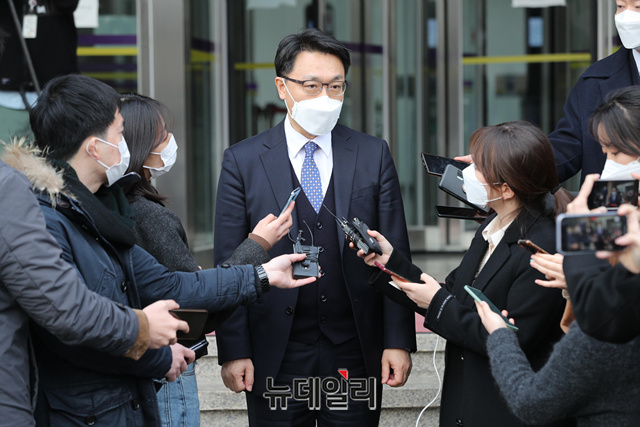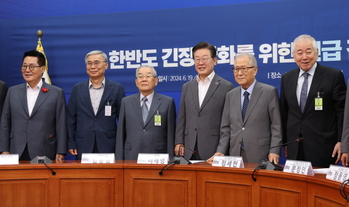"언론인 통화 내역 수집한 이유 밝혀야"… 공수처에 해명·사과 촉구
-
고위공직자범죄수사처(공수처)가 120명이 넘는 기자들의 통화 내역을 조회한 것에 대해 국제언론인협회(IPI)가 "이는 언론의 자유를 침해하고 취재원의 익명성을 위협하는 행위"라며 공수처의 해명 및 사과, 그리고 진상조사를 촉구하는 성명을 냈다. IPI는 전 세계 120개 국가의 언론인과 미디어 경영인, 편집자들로 구성돼 있는 단체로 1950년 결성된 이래 언론자유 수호를 위한 활동을 벌여오고 있다.

- ▲ 기자들과 일문일답을 하고 있는 김진욱 공수처장. ⓒ경기 과천=정상윤 기자
"무분별한 언론인 통화 내역 수집… 민주주의 규범 위배"
IPI는 지난 25일(현지시각) '기자의 통화 기록에 접근하는 것은 언론의 자유를 침해한다(South Korea: Accessing journalists’ phone records compromises press freedom)'는 제목의 성명에서 "최근 몇 주 동안 더 많은 한국 기자들은 정부 당국이 자신들의 통화 기록에 접근해 왔다는 사실을 알게 됐다"며 공수처가 일부 외신 언론사(아사히신문·마이니치신문·도쿄신문·닛케이신문)를 포함해 22개 언론사 기자들(120명 이상)의 통화 내역에 접근한 사실을 거론했다.
IPI는 "공수처가 아무런 설명도 없이 이러한 대규모의 자료를 수집하는 것은 언론 자유를 침해하고 취재원의 익명성을 위협한다"며 "언론인들은 취재원을 보호할 권리를 지켜야 하고, 정부의 감시 없이 업무를 수행해야 한다"고 강조했다.
IPI는 "현행 한국 법률은 공수처가 논란이 되는 인물에게 알리지 않고 통화 기록에 접근할 수 있도록 허용하고 있다"며 "따라서 조회 대상이 되는 기자의 수는 아마도 공식적으로 알려진 것보다 훨씬 많을 공산이 큰데, 공수처는 기자의 통화 내역에 접근한 이유에 대해 어떠한 설명도 하지 않았다"고 지적했다.
"언론인은 취재원을 보호할 권리를 가져야"
스콧 그리핀(Scott Griffen) IPI 부국장은 "한국에서 공수처가 120명이 넘는 기자의 통화 내역에 접근했다는 것은 매우 놀라운 일"이라며 "이러한 행동은 내부고발자 등 취재원의 신원을 보호하고 국가 감시로부터 자유롭게 일할 수 있는 언론인의 권리를 명백히 훼손하는 것"이라고 단정했다.
이 같은 공수처의 행위는 특히 '탐사 저널리즘'에 해롭다고 지적한 그리핀 부국장은 "공수처가 기자의 통화 내역을 대량 수집하는 것은 부패 또는 다른 불법 행위에 대한 정보를 가진 취재원이 증언하거나 언론에 편안하게 이야기할 가능성을 줄일 수 있다"며 "공수처의 임무가 고위층 부패 척결이라는 점에서 이는 역설적"이라고 비판했다.
그리핀 부국장은 "IPI는 공수처가 민주주의적 규범에 위배되는 무분별한 언론인 통화 내역 수집을 중단할 것을 촉구한다"며 "공수처는 언론인과 그 가족을 표적으로 삼은데 대해 공개적으로 해명해야 하며, 이 같은 자료 수집이 승인 및 수행된 이유와 방법에 대해 철저히 조사해야 한다"고 강조했다.
다음은 IPI 성명 전문(한글 번역문).
<기자의 통화 기록에 접근하는 것은 언론의 자유를 침해한다>
IPI는 120명이 넘는 기자의 통화 내역에 접근한 공수처의 관행에 대해 조사할 것을 촉구한다.
최근 몇 주 동안 더 많은 한국 기자들은 정부 당국이 자신들의 통화 기록에 접근해 왔다는 사실을 알게 됐다. 고위공직자범죄수사처(공수처)는 일부 외신 언론사를 포함해 22개 언론사의 최소 120명 기자들의 통화 내역에 접근했다. 공수처가 아무런 설명도 없이 이러한 대규모의 자료를 수집하는 것은 언론 자유를 침해하고 취재원 익명성을 위협한다. 언론인들은 취재원을 보호할 권리를 지켜야 하고, 정부의 감시 없이 업무를 수행해야 한다.
공수처는 고위공직자가 연루된 부패 사건을 수사하기 위해 2021년 설립됐다. 현행 한국 법률은 공수처가 논란이 되는 인물에게 알리지 않고 통화 기록에 접근할 수 있도록 허용하고 있다. 따라서 (조회)대상이 되는 기자의 수는 아마도 공식적으로 알려진 것보다 훨씬 많을 공산이 크다. 공수처는 기자의 통화 내역에 접근한 이유에 대해 어떠한 설명도 하지 않았다.
더욱이 공수처 및 다른 사법기관들은 영장 없이 통신사에 통화 내역을 요구할 수 있다. 하지만 만약 공수처가 통화 시간 및 장소와 같은 세부적인 통화 기록을 조사하고자 할 경우에는 법원의 영장이 필요하다.
TV조선은 직원의 통화 내역을 조회당한 언론사 가운데 하나이다. 언론사에 따르면, 공수처는 34명의 뉴스 기자를 포함해 70명 이상의 TV조선 직원들의 통화 내역을 조회했다. 기자들이 연관된 두 가지 사건에 대해, 공수처는 더 구체적인 기록에 접근하기 위해 영장을 발부받았다.
이채현 TV조선 취재기자는 IPI에 “공수처나 다른 수사기관이 원할 때마다 익명의 제보자나 내부고발자가 누구인지 알아낼 수 있다는 사실을 알게 돼 화가 난다”며 “나는 정당한 방식으로 기사를 보도했다. 법원이 어떻게 내 통화 내역에 대한 영장을 발부할 수 있는가? 나는 범죄자가 아니다”라고 말했다. 또 “나는 수사관들이 왜 내 개인정보를 조회했는지에 대해 공수처가 타당한 설명을 해주기를 바란다”고 말했다.
일부 기자들은 그들 가족의 통화 기록도 조회당했다는 사실을 알게 됐다. 이채현 기자는 “공수처가 어머니와 여동생의 통화 기록을 조회했다”며 “그들(가족)은 공수처나 공수처 관련 어떤 사건과도 연관이 없다. 가족들에게 너무 미안하다”고 말했다.
스콧 그리핀(Scott Griffen) IPI 부국장은 “한국에서 공수처가 120명이 넘는 기자의 통화 내역에 접근했다는 것은 매우 놀라운 일”이라고 말했다. 그는 “이러한 행동은 내부고발자 등 취재원의 신원을 보호하고 국가 감시로부터 자유롭게 일할 수 있는 언론인의 권리를 명백히 훼손하는 것이다. 이는 특히 탐사 저널리즘에 해롭다. 실제로, 공수처가 기자의 통화 내역을 대량 수집하는 것은 부패 또는 다른 불법 행위에 대한 정보를 가진 취재원이 증언하거나 언론에 편안하게 이야기할 가능성을 줄일 수 있다. 공수처의 임무가 고위층 부패 척결이라는 점에서 이는 역설적이다”라고 덧붙였다.
그는 또 “IPI는 공수처가 민주주의적 규범에 위배되는 무분별한 언론인 통화 내역 수집을 중단할 것을 촉구한다. 공수처는 언론인과 그 가족을 표적으로 삼은데 대해 공개적으로 해명해야 하며, 이 같은 자료 수집이 승인 및 수행된 이유와 방법에 대해 철저히 조사해야 한다. 우리는 또한 공수처 및 유사 기관의 수사과정에서 반드시 필요한 보호 장치를 구축하도록 가능한 빨리 개정을 시행할 것을 요구한다. 특히 수사관은 언론인이 연관된 모든 형태의 통신 기록에 접근하기 전에 영장을 발부받아야 하며, 모든 경우에 이러한 데이터 수집 대상에게 이를 즉시 알려야 한다”고 말했다.
기자는 취재원을 보호할 권리를 가져야 한다
공수처는 고위층의 부패를 조사하기로 돼 있지만, 일부 기자들은 취재원을 알아내기 위해 (공수처가) 자신들의 통화 내역에 접근한 것으로 의심하고 있다.
정동권 TV조선 취재기자는 “(공수처의 기자 통신 조회는) 특종 기사의 취재원을 밝혀내기 위해 국가정부기관의 권력을 남용하는 것이다. 공수처는 배후가 누구인지를 찾으려고 시도했다”고 말했다.
그는 통화 내역이 조회될 경우 당사자에게 자동으로 알리도록 법이 개정되기를 희망했다.
통화 기록 조회를 당한 또 다른 기자는 김지아 TV조선 경제산업부 기자였다. 김 기자는 법 개정을 촉구하며 “공수처 및 다른 수사기관들은 무분별한 개인 정보 열람을 중단할 필요가 있다. 이는 언론의 자유에 반하는 것”이라고 말했다.
김지아 기자와 이채현 기자는 취재원이 익명성을 신뢰할 수 없을 경우 한국의 독립 저널리즘의 미래에 대해 우려를 표했다.
이채현 기자는 “공무원과 수시관들이 나에게 아무런 통보도 없이 몇 번이나, 또 얼마나 오랫동안 나의 통화 기록을 조회했을지 우려된다. 오래 전에 접촉했던 내부고발자나 익명의 제보자에 대해서도 걱정된다. 이번 사건 이후 어느 제보자가 나에게 와서 그들의 정보나 의견을 사실대로 이야기할 수 있을까?”라고 반문했다.
한국 언론 뿐만 아니라 공수처는 일본의 아사히신문, 마이니치신문, 도쿄신문, 닛케이신문 등 최소 4개의 외국 언론사 기자의 통화 내력에도 접근했다.
다음은 IPI 성명 원문.
<South Korea: Accessing journalists’ phone records compromises press freedom>
IPI urges South Korea to investigate practices by anti-corruption agency, which accessed phone data of over 120 journalists
In recent weeks, growing numbers of journalists in South Korea have learned that authorities have accessed their phone records. At least 120 journalists from 22 different media organizations, including several foreign media outlets, have had their phone data accessed by the Corruption Investigation Office for High-Ranking Officials (CIO). Such mass data collection – for which the CIO has offered no explanation – compromises press freedom and risks the anonymity of journalists’ sources. Journalists must maintain the right to protect their sources and work without government surveillance.
The CIO was founded in South Korea in 2021 to investigate instances of corruption involving high-ranking officials. Current South Korean law allows the CIO to access phone records without notifying the person in question. The number of journalists targeted is therefore most likely higher than is officially known. The CIO has not given any explanation as to why it has accessed the journalists’ phone records.
Moreover, the CIO and other law enforcement bodies can request phone records from telecommunications companies without a warrant. However, a warrant from a court is needed if the CIO wants to investigate the details of phone records such as the length and location of calls.
TV Chosun is one of the media outlets whose staff had their phone records accessed. According to the outlet, the CIO looked up phone records of more than 70 TV Chosun staff members, including 34 news reporters. In two cases involving journalists, the CIO was granted a warrant to access more detailed records.
“I am frustrated to find out that the CIO, or other investigative organization, could find out who an anonymous informant or whistleblower is whenever they want to”, Chae Hyun Lee, an investigative reporter at TV Chosun, told IPI. “I covered stories in a proper way. How can the court issue a warrant for my phone records? I am not a criminal.”
“I hope the CIO can give a reasonable explanation as to why my personal information was looked up by CIO investigators”, she said.
Some journalists learned that phone records belonging to their family members had also been accessed.
“The CIO looked up my mother and sister’s phone records”, Chae Hyun Lee said. “They are not related to the CIO, or any incident related to the CIO. I feel terribly sorry for my family.”
“The CIO’s accessing of phone records for more than 120 journalists in South Korea is extremely alarming”, IPI Deputy Director Scott Griffen said. “Such actions clearly undermine the right of journalists to protect the identities of their sources, including whistleblowers, and to operate free from state surveillance. This is particularly harmful to investigative journalism. Indeed, it is ironic that the CIO’s mandate is to combat high-level corruption when its mass collection of journalists’ data will make it less likely that sources with information about corruption or other wrongdoing will come forward or feel comfortable speaking to the press.”
“IPI calls on the CIO to cease its apparently indiscriminate collection of journalists’ phone records, which is a violation of democratic norms. The CIO must offer a public explanation for its targeting of journalists and their family members, and a full investigation must be carried out into how and why this data collection was approved and carried out. We also urge for reforms to be implemented as swiftly as possible to build much-needed safeguards into the procedures of the CIO and similar bodies. In particular, investigators should be required to obtain a warrant before accessing any type of telecommunications records belonging to journalists, and the targets of such data collection must be immediately informed in all cases.”
Journalists must have the right to protect their sources
While the CIO is supposed to be investigating high-level corruption, some journalists suspect their phone records were accessed in an attempt to discover their sources.
“It is simply an abuse of power for a state investigative agency to identify the source of a scoop article. The CIO tried to find out who was behind it”, Dongkwon Chung, a TV Chosun investigative reporter, told IPI.
He hopes the law will be changed to require an automatic notification to the person whose phone records have been accessed.
Another journalist who had her phone records accessed was Ji ah Kim, a TV Chosun economy and business news reporter. She is calling for changes to the law. “The CIO and other investigative organizations need to stop indiscriminately looking over peoples’ private information. This is against freedom of speech”, Ji Ah Kim said.
Ji Ah Kim and Chae Hyun Lee expressed concern for the future of independent journalism in South Korea if sources aren’t able to rely on anonymity.
“I am worried about how many times and for how long government officials or investigators have looked up my phone log without giving any notice to me. I am also worried about whistleblowers or anonymous informants I have contacted long time ago. Can any informants approach me and truly tell their information or opinions after this incident?”, Chae Huyn Lee asked.
In addition to South Korean media, the CIO also accessed the phone records of journalists from at least four foreign media outlets, all Japanese: Asahi Shimbun, Mainichi Shimbun, Tokyo Shimbun, and the Nikkei.







